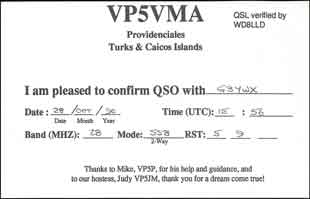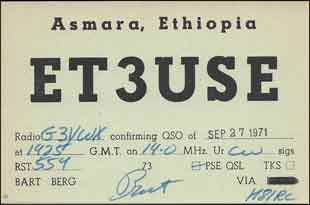QSL Managers
Often DXpeditions and stations in inaccessible areas use QSL managers in countries with good postal and electronic communications to send their cards for them.
QSL cards includes:
QSL cards
Electronic QSLs
QSL bureau
QSL managers
Vintage QSL gallery
Often when listening on the bands, rare DX stations may announce that they have a QSL manager to whom cards should be sent.
QSL managers are often used for DXpeditions and for stations operating in rare locations. The QSL manager is able to manage the QSL operations on behalf of the DX station.

QSL card showing QSL manager
Reasons for QSL managers
There are actually many reasons for using a QSL manager. The reasons can be quite varied but include:
- No bureau exists for that country: In countries where no QSL bureau exists it can sometimes pay for a station to use a QSL manager. Particularly if a station is in a where there is little amateur radio activity, many other stations may want their contacts confirmed for awards, or just to say they have contacted that country. Using a QSL manager may help stations obtain their QSL cards more easily.
- Operation is only short lived - DXpedition: as there are some countries that have very little or no amateur radio activity, expeditions travel to these countries to 'activate' them. They will typically only stay there for a short time - may be a week or two. These stations need a longer term contact point to which incoming QSLs can be sent and from which outgoing cards can be returned.
- Postal services may be poor: In some countries, postal service may be very poor, or the station may be located in a very inaccessible area. Employing a QSL manager who has much better access to postal communications will enable QSL cards to be sent and received more easily.
- Maximise operating time: Managing QSL cards can take time. Some stations may want to maximise their time on the air and give as many others as possible the chance to contact them. The use of a QSL manager can assist with this.
How to send cards via a QSL manager
Often QSL cards can be sent either directly to the QSL manager, or via the bureau.
- Direct: When sending cards to a QSL manager, it is normally expected that the return postage will be sent along. This is normally in the form of an International Reply Coupon, IRC. These can be exchanged in return for surface mail return postage. Often QSL managers will require several IRCs to pay for airmail and other expenses. Often the number of IRCs needed is noted in the DX bulletins. If no IRCs are enclosed then it is very likely that no card will be returned - at best it may be returned via the bureau. Even those with IRCs have been known to be returned via the bureau. Unfortunately IRCs are not as widely used as they were and it may not be possible to obtain them in all countries, e.g. UK. Another alternative is to include US Dollar bills in with the card.
- Via the bureau: When sending cards to a QSL manager via the bureau, the QSL manager's call should be clearly indicated on the card, saying station1 via station2. In this way, the card can be routed to the country of the QSL manager.

QSL card from ET3USE via a QSL manager
How do I know if there is a QSL manager?
There are several ways to find out if a station has a QSL manager.
Often the DX station will announce the QSL manager at intervals - so it is well worth listening to a pileup for a while having contacted a DX station.
It is also possible to find out about any QSL managers from DX newsletters and amateur radio magazines. It is also possible to check on the relevant sites on the Internet. DX stations may have their own websites which can normally be found very easily. Also the website QRX.com is likely to have information as well.
More Ham Radio Topics:
What is ham radio
Callsigns
Morse code
Voice modes
Digital data modes
QRP operating
Operating awards
Codes & abbreviations
Ham bands overview
Operating via differnet propagation modes
Repeaters
Callsigns
Contact formats
Setting up a shack & buying equipment
Return to Ham radio menu . . .


